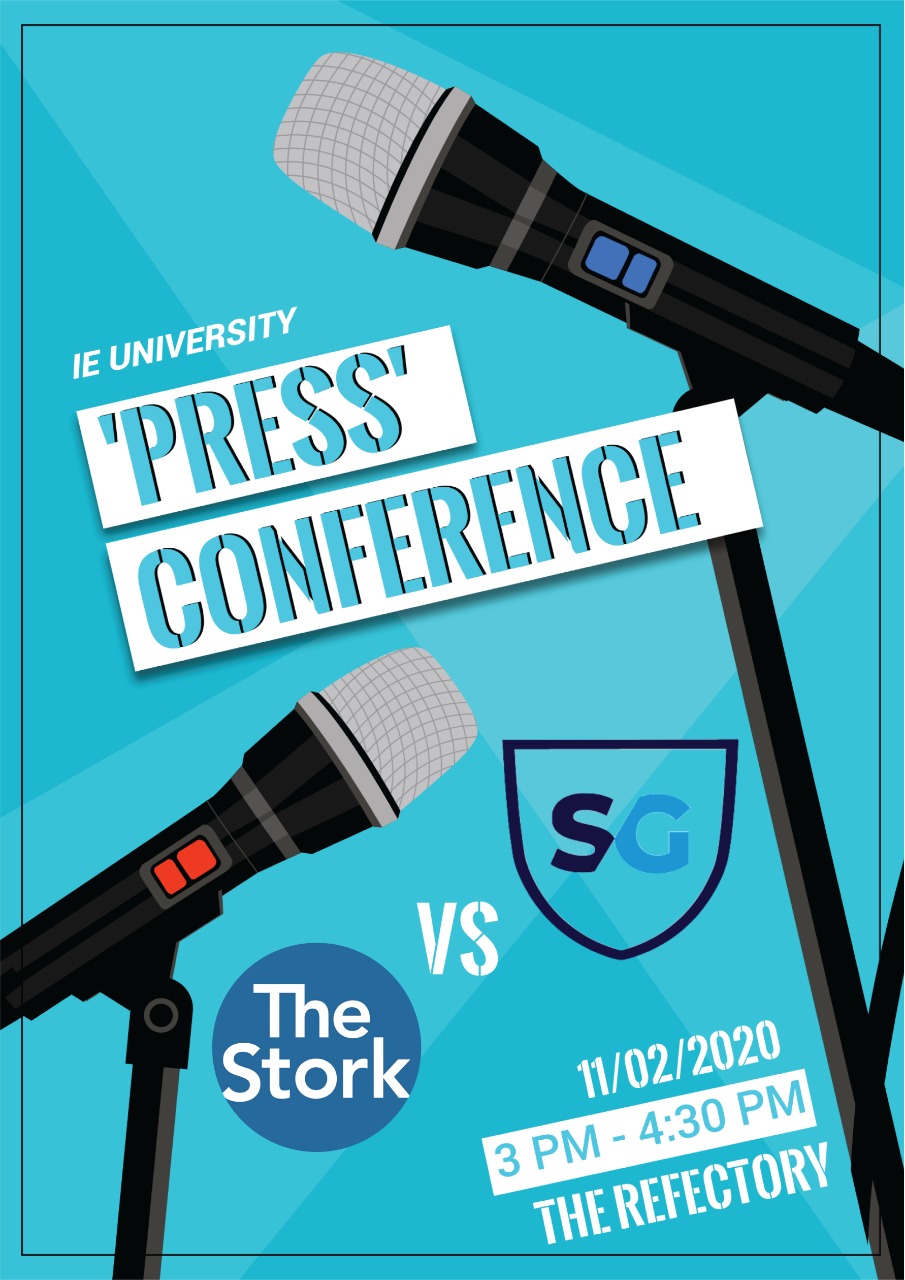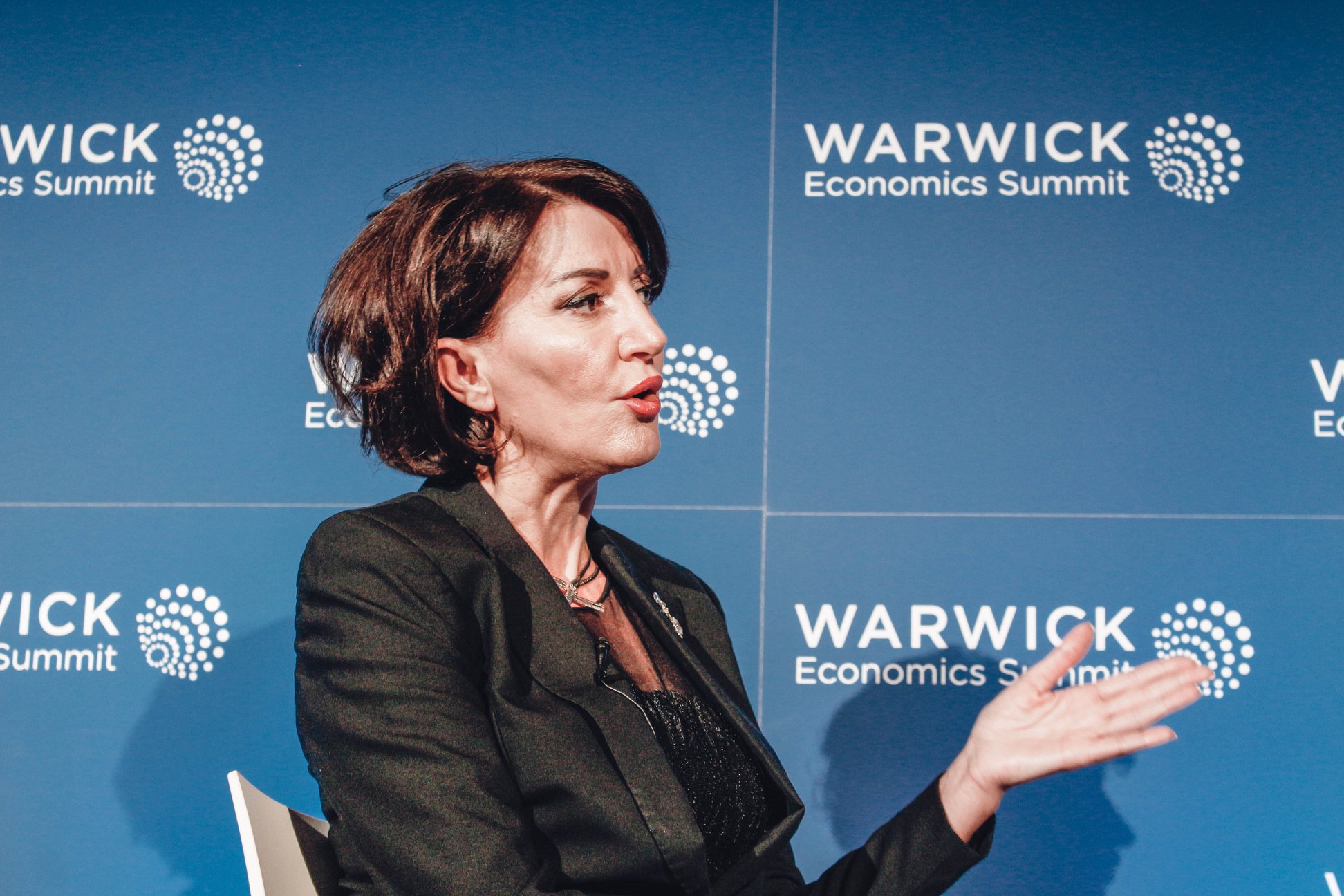[et_pb_section admin_label=”section”]
[et_pb_row admin_label=”row”]
[et_pb_column type=”4_4″][et_pb_text admin_label=”Text”]Warwick, UK – Friday, January 31st, the Stork was invited to attend the 2020 Warwick Economic Summit.
On the eve of the official Brexit, students from around the globe gathered into “The Oculus.” The state-of-the-art tiered lecture theater once again was host to many important figures, including former heads of state, renowned economist, and Nobel Prize laureates. This was the 19th Annual Warwick Economic Summit.
Begun in 2002 as the first ever inter-university undergraduate economics event in the UK, the WES has grown from only 170 students from around the UK to repeatedly having long waiting-lists, instantly-filled ticket queues, and international representation. The Summit is now one of Europe’s premier student conferences, being one of the largest student-run forums of its kind.
The WES was kicked off by host students Ananya Kumar and Parth Devalia, who began by thanking the student coordinators that made the event possible. They then displayed a short video message from Chancellor of the Exchequer, the Rt. Hon. Sajid Javid, MP. The Chancellor spoke of the economic recovery efforts that dominated the last decade, the lasting scars from the Great Recession. He spoke of “not abandoning the sensible policies of the last decade, while making sure our economic plan addresses the question of the day, not ten years ago.” Most of all, he spoke of the problem of regional inequality in the UK, and invited attendees to reach out to his office with potential solutions.
For its opening talk, the hosts invited Zanny Minton Beddoes – editor in chief of the Economist and first female to ever hold the position – and Liam Halligan, an economic journalist/editor for the Sunday Telegraph. The two briefly went over their own histories, and the round-about-way they ended up in journalism. Ms. Beddoes explained how she had a moment of realization of what the free-market was, witnessing Polish entrepreneurs selling good out of their cars following the fall of the Berlin Wall, and how it drove her into economic policy and its review. Mr. Halligan had a similar experience in early free-market Russia. They then talked about how economics has changed since the 90’s, from “freshwater” economics based on elegant but unrealistic models to “saltwater” economics that draws from other fields such as psychology and anthropology.
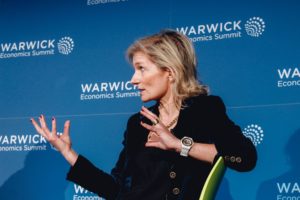
Ms. Beddoes then lamented some of the modern issues around quality journalism and economics. While “vibrant debates” still exist, people now operate in more of an “echo chamber, … reading what they want to read, … reinforcing their pre-existing opinions and prejudices.” Paraphrasing Michael Gove, a British conservative politician, she stated “I think we’ve had quite enough of experts,” reiterating some of the distrust of experts and institutions that lead to Brexit. Among other things, Ms. Beddoes told that Brexit would lead to a “less free-trade equilibrium” than was previously held, that the WTO was “on its last legs,” and bilateralism and statist managed trade – led on by US mercantilism – seem to be the coming norm. Finally, they spoke of the European single market currency, and the need for fiscal monetary policy.
Next came Professor Jennifer Smith of the University of Warwick. Professor Smith is a member of the MAC, or Migration Advisory Committee, and spoke on the matters such as immigration in the UK and its likely effect on the economy pre-and-post-Brexit. She first firmly reiterated the benefits of qualified migrants to the UK; how they hold a positive net fiscal value, how they help to distribute rather than clog the NHS, etc. She then explained the pay scale for Tier 2 (General Work) Visas migrant workers, and the problems. with the current system – one resonating issue was that only 27% of all EEA migrants since 2004 were eligible for a Tier 2 Visa. These issues are compiling with Brexit, and in paraphrasing the frustrated outgoing chair of the MAC, “the consequences will be severe” for Britain in the coming years should it fail to adequately alter its migrant policies.
As the final individual speaker of the night, Sharon Donnery took to the podium. Ms. Donnery is the Deputy Governor of the Central Bank of Ireland, as well as the Chair of the ECB’s Budget Committee. She began by commemorating the “historic precipice” culminating on the eve of Brexit, before going on to explain her role and the role of central banks in economies, being that they are primarily charged with providing price and financial stability. As she illustrated, one need only look to Germany or Zimbabwe to see the “devastating cost of price instability.” Ms. Donnery further went on to speak of the necessity to craft more policies with the aim of reducing “the possibility of [another] system crisis occurring.”
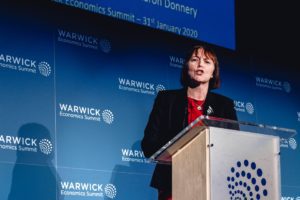
The Deputy Governor then switched gears as she began to speak of the new challenges posed by the “cost of inaction” when considering climate change, and what that means for political and socio-economic issues. She considered climate risks particularly unusual for four main reasons: first, they are extremely broad; second, there remains a high degree of certainty of these risks being realized; third, the period of management is significantly greater than that of typical planning; fourthly, and most critically, the risks are international, and mitigation requires coordination between all stakeholders across all countries and continents – an extremely difficult task. Ms. Donnery further went on to challenge an oddly posed question from the audience on cryptocurrencies and their overall effectiveness, as they have yet to be proven more stable and reliable than proper government-backed currencies.
Finally came the closing Panel – “The Future of Britain’s Relationship with the EU,” jointly organized by the European Parliament. The panelist included: Chris Leslie (Former British MP, founding member of the Independent Group), Brando Benifei (MEP, Italian Democratic Party), Gertrude Tumpel-Gugerell (Former Executive Board Member of the ECB, and Former Vice-Governor for the Austrian Central Bank) , Malcolm Harbour (Former MEP, UK Conservative Party), Molly Scot Cato (MEP, UK Green Party), with Joe Lynam (an award-winning broadcaster with the BBC) as the moderator.

Immediately, Mr. Lynam took stock of the attendees. How many were British and voted in the referendum? How many held EU passports, and importantly could not vote in the referendum? Just as quickly, the room became tangibly quiet and somber. Mr. Harbour stated solemly “I feel a bit like I did when I woke up … and heard the results … that sinking feeling. I think I feel more isolated.” Ms. Tumple-Gugerell was even brought to moving tears, remembering some of the extreme anti-EU sentiments held by a minority being brought to the forefront and tearing the EU and UK apart. Mr. Benifei and Ms. Cato expressed their hopes and fears for the Erasmus Exchange Program and general academic opportunities within the UK.
Further problematic would be the economics, as Mr. Leslie explained. As the British economy largely depends upon service industry, and its changing trade deal dynamics would, at the moment, greatly hinge upon London banks betting on their own importance to the European market(s), there could be a great deal of turbulence coming for the UK. Similarly, should the British economy not be able to re-integrate itself into the European market, it may be forced to join (and compete with) the American market bloc.
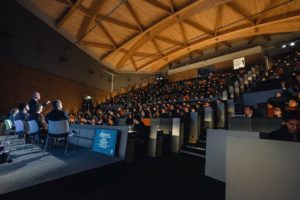
On those numbing notes, the panel ended. A wine reception was held shortly after, but looming in the air was the inevitable – two hours later, Brexit finally happened. After three and a half years of debate and debacle, the UK left the EU. Nevertheless, the conference, and the UK, marched onward.[/et_pb_text][/et_pb_column]
[/et_pb_row]
[/et_pb_section]


